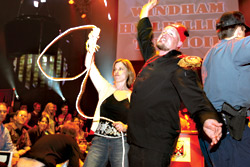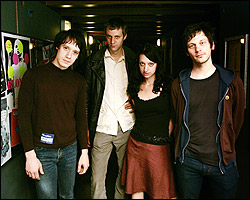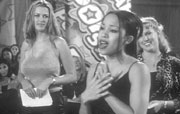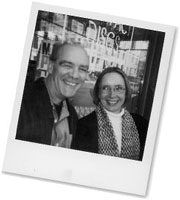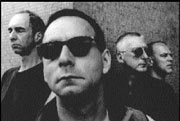According toThe Economy of Prestige, a new study of contest culture in the arts by James English, each year there are 9,000 movie awards given out while just 4,500 movies are released to vie for them. And similarly, the number of yearly literary prizes threatens to eclipse the number of new books. Just as art is married to commerce, it’s been fraternizing with competition more and more these days. Americans seem to need winners and losers, and it apparently doesn’t matter if the contests that generate them are meaningless marketing tools or mindless media machines. Our local arts scene mirrors this need for contest and resolution; moreover, on any given evening, the line separating the contest from the artwork is blurring.
The Xtreme Theater League (XTL), for example, is currently staging a monthly series of battles at the Capitol Hill Arts Center. Teams culled from a variety of local theater companies face off in three rounds: scene, monologue, and wild card. Audience response determines the winner of each round, and at the end of the season, the team with the most points will be awarded the title Seattle’s Best Theatrical Troupe. It’s impossible to separate the contest from the performance—and that’s the point.
Seattle’s longest-running example of contest fused with art is perhaps the Seattle Poetry Slam, wherein local poets perform short pieces and are judged by a panel of audience members. Local promoter and club owner Dave Meinert helped bring the format to local stages in the mid-’90s, and like all the organizers I spoke to, he doesn’t mince words when asked about the competitive element of the event he now hosts at the Mirabeau Room.
“I think a competition is first and foremost a marketing tool,” says Meinert, “then a way to create an entertaining show.”
For XTL, performances are meant to parody all competition-based entertainment. Hosts mock Howard Cosell and joke that the evening will be full of “theaction.” Especially because the cast is recycled from other casts, the theaction ends up feeling a lot like MTV’s Real World/Road Rules Challenge. Co-producer Cory Nealy says the most important end result is an entertained audience; the contest framework is merely a way of engaging ticket holders and challenging performers to do their best work. I’m fairly certain MTV would concur.
For dadaist Mike Min, a member of the performance group Seattle School, whose songwriting event, Iron Composer, is a cerebral drunken party, competition is another construct around which art can be built. “Competition is a salient and primitivistic tool to engage audiences. It’s a parameter that’s akin to time in its ubiquity and influence.” Try explaining that one to MTV, or Clay Aiken and the American Idol judges.
But is winning everything? Does competition—whether it’s used as a marketing tool, a mirror held up to an American obsession, or a John Cage– influenced experiment—produce better art? As Meinert puts it, “Competition usually makes the performer bring out the material that gets the best reaction, and it gives them incentive to present it in an exciting way. It is not necessarily the deepest, best material. [Allen Ginsberg’s] ‘Howl’ would never have won a poetry slam.”
Min says competition creates different art and adds that different does equal better, but his Seattle School partner Korby Sears says he doesn’t think anyone is focusing on “winners” of the games and competitions Seattle School devises. Like most other performances that include an element of sport, Seattle School happenings demand audience participation; you might be called onstage next.
“SS uses competition as an ingredient to enhance intensity of audience experience,” says Min. “Like ancient gladiators, the actual competitors don’t really matter. They’re just pieces in the gestalt of the experience. And if you eliminate the notion of a subsequent prize or punishment, then competition becomes incredibly interesting.”
Insomuch as this is true, we’re all winners.
